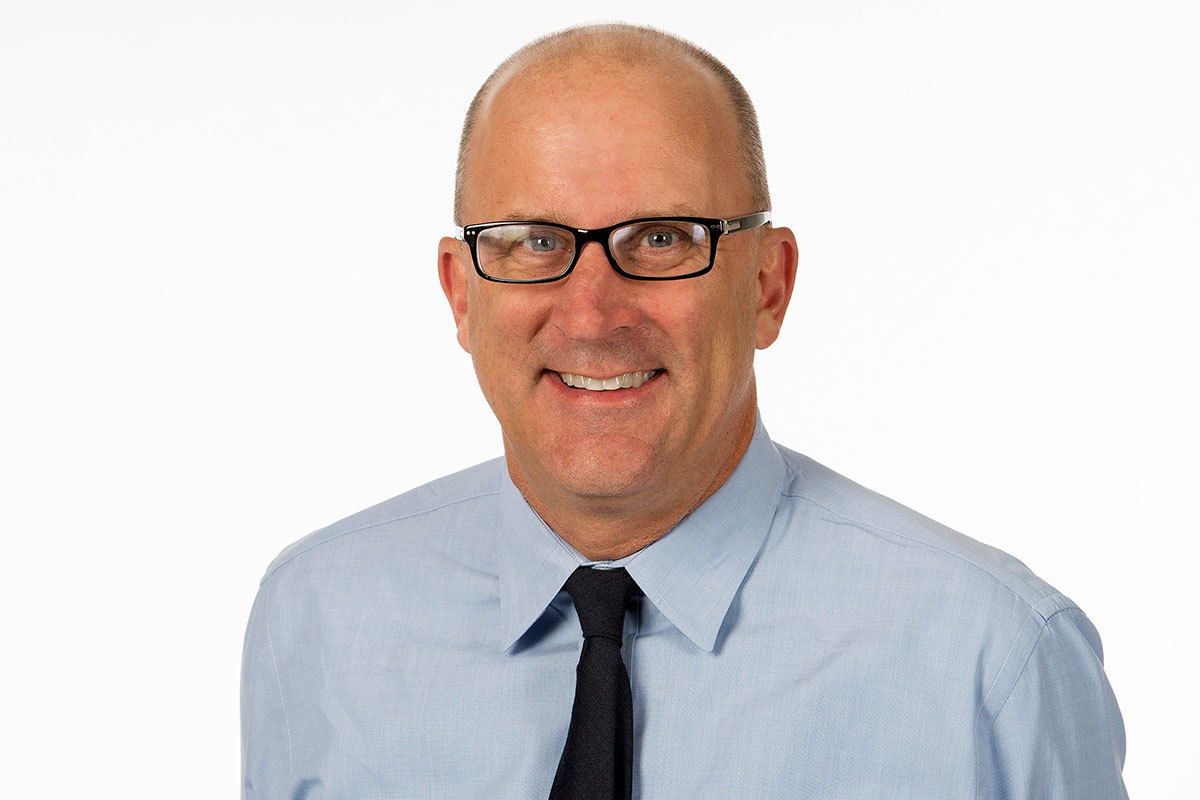
John T. McGreevy has been the I.A. O’Shaughnessy Dean of the College of Arts and Letters since 2008. After two five-year terms as dean, he has decided to move on. Effective July 1, he will become the Francis A. McAnaney Professor of History and begin a yearlong research leave. This summer, he shared his thoughts as outgoing dean, his hopes for the future of the College, and his excitement about incoming dean Sarah Mustillo, professor and chair of the Department of Sociology.
You’re at the end of 10 years as dean. What do you see as the biggest changes in the College of Arts and Letters over that time?
I was lucky — I came into something really great. But there have also been big changes. I think overall our departments are significantly stronger. Probably the most pronounced changes are in the social sciences, especially economics, where our growth in student numbers, faculty numbers, and faculty quality is an extraordinary story. Really across the social sciences, though, all of our departments have taken significant strides. So I’m pleased about that. Of course, that reflects the good work of the faculty, not necessarily the work of the dean. Still, that would be one accomplishment.
On undergraduates, we’re stronger generally in the students that we’re attracting to Notre Dame, which is a credit to the university’s reputation and its strong financial aid, but I also think we’re giving them a much better, more challenging experience. Some of that has come through reforms in general education — the God and the Good Life course in philosophy is one example, and other new programs that we’ve developed such as the Idzik Computing and Digital Technologies Program.
I do think the increase in students writing a senior thesis has been a nice story, to go from 9 percent to over 40 percent in a decade. (see below). I think our graduate programs are stronger as well, certainly in the students they attract, which is a direct reflection of the quality of our faculty and the competitiveness of our financial packages. Our programs are also more streamlined, too, and we are more self-conscious about students exploring both academic and non-academic careers where they can use their training.
“On undergraduates, we’re stronger generally in the students that we’re attracting to Notre Dame, which is a credit to the university’s reputation and its strong financial aid, but I also think we’re giving them a much better, more challenging experience.”
Why was strengthening the senior thesis culture in the College so important for you? Why make that such a focus?
The pool of undergraduates we now admit at Notre Dame is as talented as virtually anybody in the country, in terms of experience, drive, motivation. And I think at times we had not pitched high enough for them. I think there are a lot of ways to do that, but the senior thesis is one way to offer a more intense and sophisticated education.
I was a faculty member at Harvard before I came here, and I was stunned by the quality of the best senior theses done by Harvard undergraduates. I knew that our students could do something similar, and yet even 10 years ago, most of our departments didn’t have an option to do a senior thesis. We had happy exceptions to that generalization in PLS and the Glynn program and we built off of their accomplishments.
I’m confident that undergraduate research is going to be one of the defining features of selective private higher education, one of the things that make parents and students willing to sacrifice to attend these institutions. We see this interest, powerfully, in science and engineering as well as in the humanities, social sciences, and the arts.
In order to do better, I wanted a concrete proposal or goal, to raise the percentage of students doing senior theses. For me, it was important to work that goal into the tenure and promotion process, and for faculty and departments to see this as part of their ordinary teaching. Not all great teaching occurs in the classroom and I honestly think we’ve changed that conversation across the College.
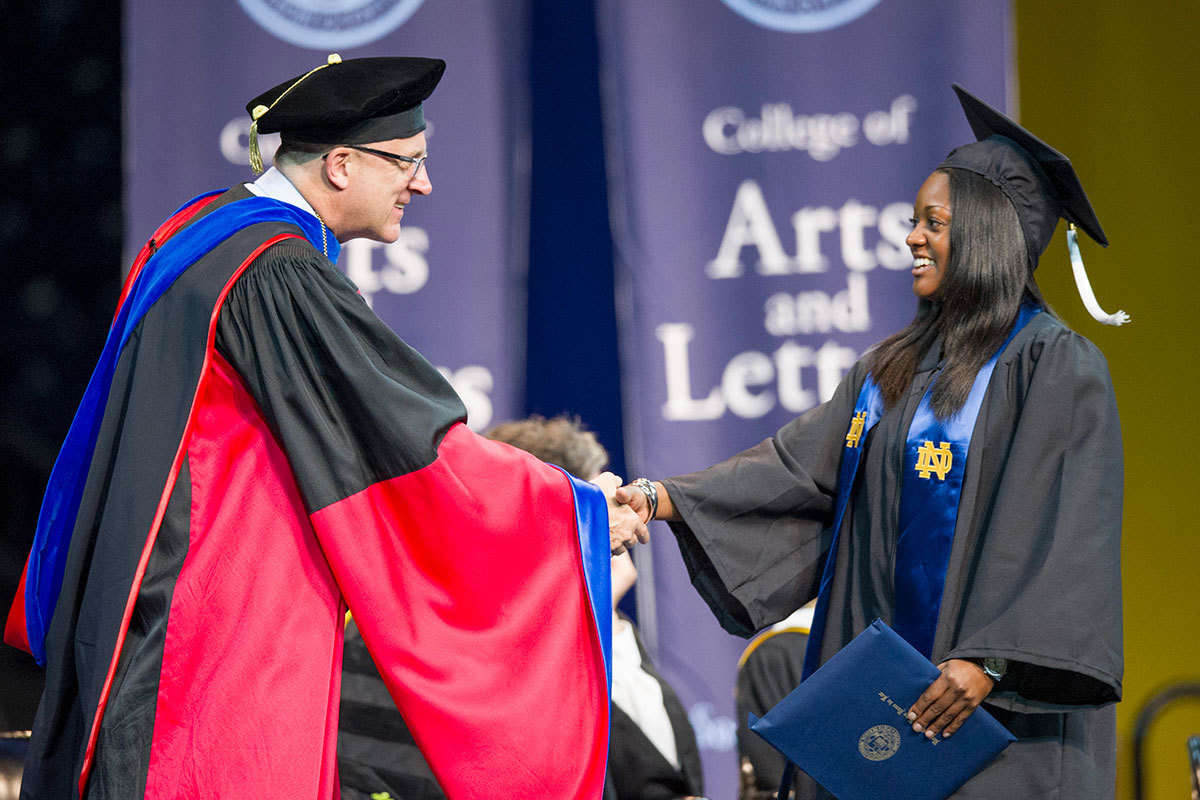
What advancements have been made in Arts and Letters graduate programs?
In graduate education, the biggest reform has been the 5+1 Postdoctoral Fellowship Program. I became dean just a couple of months before the crash of 2008, which in so many ways has shaped our country and also higher education over the last decade. It made students and parents more anxious about the financial return on a liberal arts education. In turn, this has dramatically changed the academic job market in many fields and forced us to innovate.
5+1 is the most obvious example, where we said to students that if they finish the Ph.D. in five years, they would get an extra year of funding as a postdoc. The goal is to get students through their degree and ready for any job market that they would enter, and do so in a fiscally responsible and a morally responsible manner. I’d always felt that Ph.D. students take too long to complete their dissertations, and the data reflected that at Notre Dame, certainly in the humanities but in some of the social sciences, too.
What’s been fun for me is to see us bring down time to degree, and to see other places in the country call us up and ask us about how we’re doing that. And that was why we received the Mellon Foundation funding. We’re not the only place doing this, but I think we’re one among a small pool and in so doing we’ve become a bit of a model.
In graduate education you have to be very cautious about new programs, given the job market, and you have to think through what you really want to do. We closed a couple of programs and we started three new Ph.D. programs in my time — the Ph.D.s in Spanish and Italian and the Ph.D. in Anthropology. We also began the Calvin M. Bower DMA in Sacred Music. And I think all of these programs are off to a great start. I feel really good about them.
What have been some of the biggest changes in terms of research in the College?
I do think our arts departments and programs have never been stronger. The expansion of film, television, and theatre, for example, the enhanced flourishing of Shakespeare at Notre Dame, and the building of the design program all occurred in the last decade. Sacred Music has quickly become a national leader with strong placement for all students and a tight identification with the university’s mission. Those are all significant success stories in the arts that we didn’t have at the same level and scope a decade ago.
In the humanities, it’s been more about sustaining existing elite departments. We’ve invested deeply in history, and I think the rankings bear out that that investment has been a fruitful one. We’ve sustained the elite level of philosophy and theology, and there was some concern 10 years ago that we might not be able to do that. That’s still a challenge for us, but that’s important for us as a Catholic research institution, to be very good in those areas. English has seen a large turnover in its most distinguished faculty but there too I think we’re well positioned with new hires over the past 10 years. And I think we’ve built religion across the College as a kind of signature strength that goes beyond a particular department.
Latino studies crosses the humanities, arts, and social sciences — and beyond — and its success has been nice for us, entirely due to terrific leadership in that area. It’s also been heartening because of our need for a more diverse faculty and its centrality to our Catholic mission.
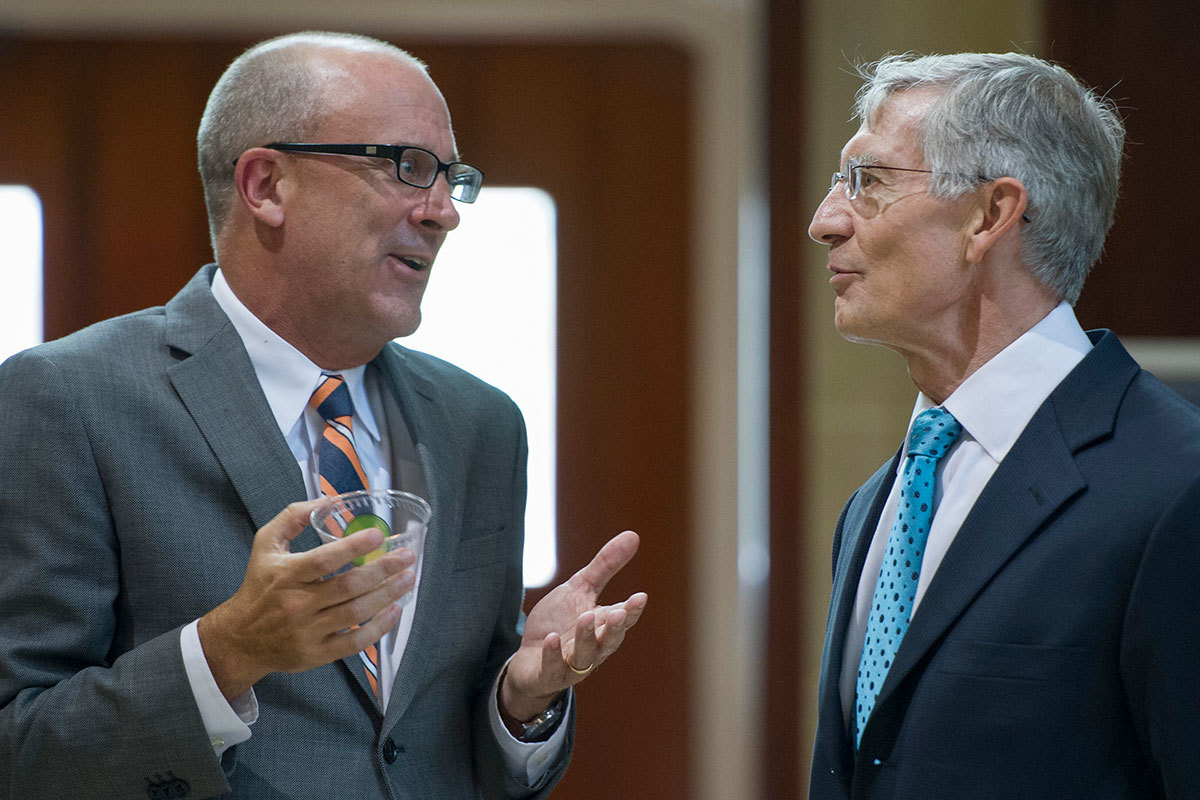 Dean McGreevy with Thomas G. Burish, Charles and Jill Fischer Provost
Dean McGreevy with Thomas G. Burish, Charles and Jill Fischer Provost
One of your goals coming in was to make Arts and Letters more collaborative, both across the College and then across the University. How have you seen that play out?
We still need to hire more and develop more faculty with the capacity to reach across departments with research programs and build more collaborative projects — not that every faculty person has to be doing that, that would be foolish. But we need more of them.
The area where I think we’ve developed collaboration pretty well is undergraduate programs. And so I certainly didn’t envision 10 years ago that we would have computing and digital technologies and now data science minors, which are collaborations with Math and the College of Engineering. And those I think are wonderful to give liberal arts students a significant taste of computer programming or data science.
We built a business economics minor after the 2008 recession, when nothing of its type existed, and that’s been a huge success for us. The collaborative innovation program within Art, Art History, and Design is reaching out across the campus, and that’s very positive. Neuroscience is the first joint major in the history of the University. That’s a pretty significant array of curricular programs that cross colleges and schools. And then, of course, the biggest one will be with the Keough School of Global Affairs, and their recently approved supplementary major, which will involve all kinds of Arts and Letters faculty and students.
“I wish everybody could have my experience. By that, I mean seeing how hard people work and how much they believe in Notre Dame.”
How has your understanding of Notre Dame as an institution evolved over the 10 years?
Well, I’m sort of a belly-of-the-beast person at Notre Dame. I was an undergraduate here and my dad went here in the ’50s, and it was the place I most wanted to attend as an 18-year-old. I had no idea I’d come back here as a faculty member. Still, given all that, I do feel that I know the institution much differently now, after a decade as dean.
I wish everybody could have my experience. By that, I mean seeing how hard people work and how much they believe in Notre Dame. I see it first and foremost with benefactors. These are men and women who are often making the biggest philanthropic decision of their lives, to give money to Notre Dame. And I’m just humbled all the time by their confidence in the University’s mission — it really is striking. I also see it in the department chairs, with the staff and associate deans in the dean’s office, the senior staff — how hard they work, how passionate they are about the work. Honestly, it’s affirming.
We’re in an age that’s cynical about institutions. I’m not at all cynical about Notre Dame. I really think there are so many people here trying to do excellent work and who believe in the idea of Notre Dame as a great Catholic research university.
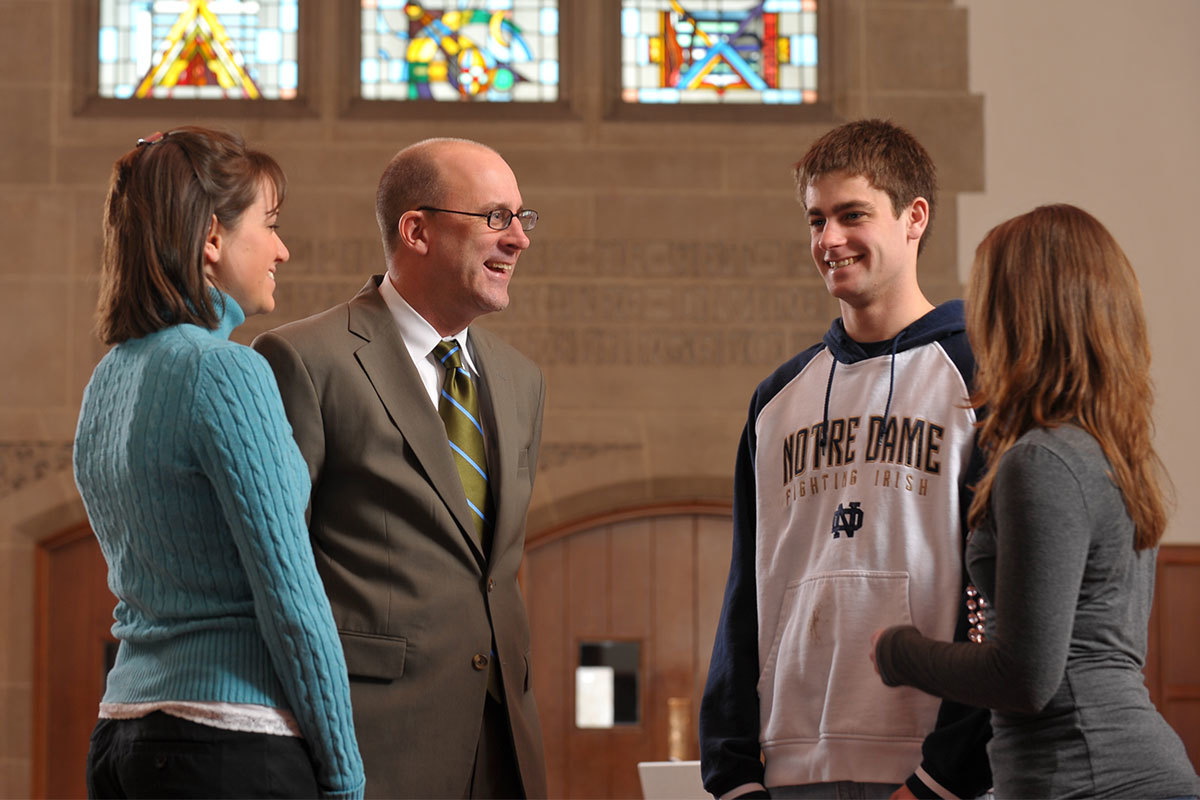
What are the College’s greatest strengths?
It’s all people. People, people, people. I’m very proud of the new facilities we have — those are game-changers, and if we didn’t have them, we’d want them. We never had a new building for the social sciences and in the last 10 years we’ve built two. We needed a building for music and we built that. Now we are thinking about facilities for art and reimagining our space in the humanities. But we’re in a people business, fundamentally, and that’s about hiring quality people, about developing them and their capacities to be excellent scholars and teachers, bringing students into the College and training them effectively.
We’ve never had a stronger faculty. We’ve never had a stronger student body. We’ve never had more resources. And all that’s a burden because we have to live up to that, but it’s also a great opportunity.
The faculty and the students who are attracted to Arts and Letters, — and this is true of course of all the colleges and schools but maybe disproportionately true here — are doing it because they love it. And that’s special. And in fact, I’m convinced that it’s only out of passion that comes great scholarship and great education.
Students should not major in X in Arts and Letters because that’s the sure route to, I don’t know, wealth and influence or something. They should do it because they’re really interested in it. And oddly enough, that’s the best thing they can do — to study what they love and to know that it can take you anywhere.
“Students should not major in X in Arts and Letters because that’s the sure route to wealth and influence. They should do it because they’re really interested in it. And oddly enough, that’s the best thing they can do — to study what they love and to know that it can take you anywhere.”
During your decade as dean, there has been a sort of ongoing national conversation about the value of the liberal arts. How have you addressed those kinds of questions from parents and students?
Parents and students are much more anxious than when I was in school. And I understand that. Education at a place like Notre Dame is a very expensive thing. The job market for our students is in fact very good, better than 10 years ago, but also turbulent. And so that creates anxiety. We’ve had to get better at telling our story about the value of the humanities, social sciences, and arts in that climate.
That said, I actually think the national conversation is turning a little bit. Discussions about developing adaptive learning styles and not a particular body of knowledge when you’re 18 to 22, all point in the direction of liberal arts. And what we really value is the ability to write, the ability to analyze data, the ability to speak persuasively. We think we’re training students very effectively in those areas, and everything we’re seeing from employers is emphasizing that as well.
I’m really not worried about opportunities for our students in terms of jobs and graduate schools and service programs, although I think we could do even more and better collaboration with our Center for Career Development. The value of a Notre Dame degree is significant. It’s just sharpening how we present that to an understandably anxious population and how we connect students to opportunities while they are at Notre Dame.
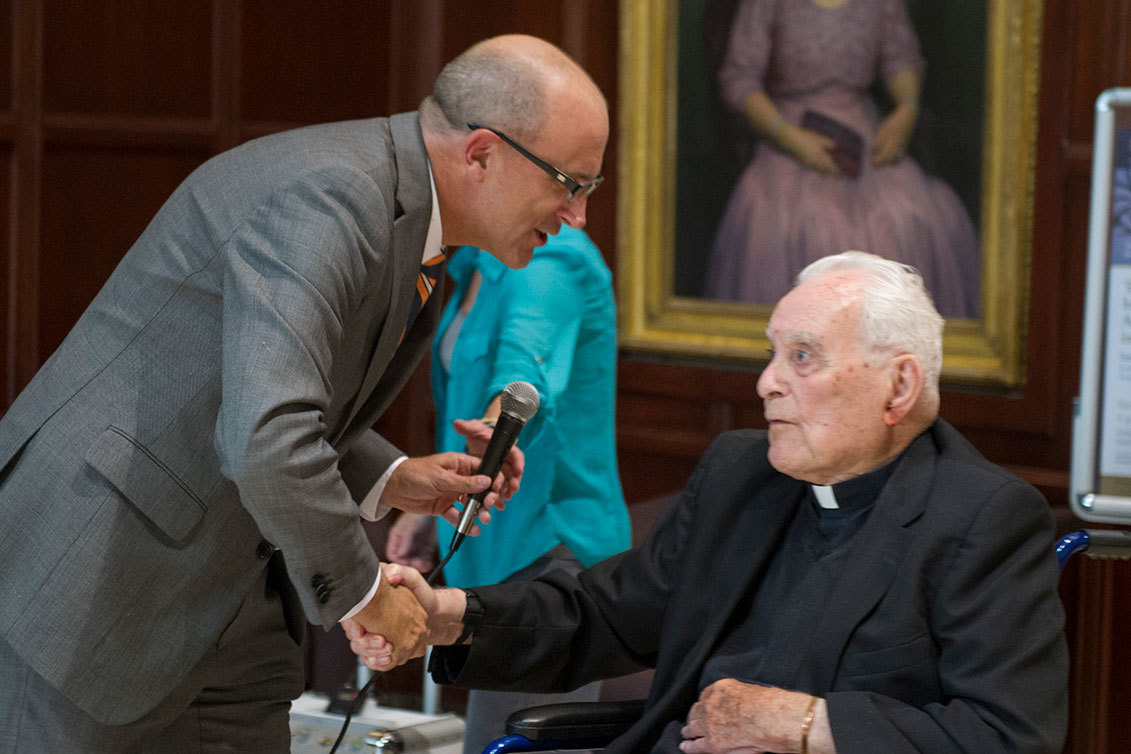 Dean McGreevy with Rev. Theodore M. Hesburgh, C.S.C., president emeritus of the University, at the rededication of the Great Hall in O'Shaughnessy in 2014.
Dean McGreevy with Rev. Theodore M. Hesburgh, C.S.C., president emeritus of the University, at the rededication of the Great Hall in O'Shaughnessy in 2014.
What were your favorite parts of the job?
The people — but more specifically, the team within the dean’s office. We have executive committee meetings where we discuss all the issues that the office confronts, and I always looked forward to that. I also grew to enjoy working with the department chairs, and there are both formal and informal ways you do that. I mentioned how humbling and fun it was to work with our benefactors and supporters.
The variety of a job like this is terrific, and I didn’t quite appreciate that from the outside. Now there’s a flip side to that, because you’re always going from meeting to meeting, and that’s not always conducive to sustained reflection. But you can have five or six different things in a day that are substantive and interesting and also utterly different from each other. I came to enjoy that.
While you were dean you published a book, taught history courses, and even directed some senior theses. How hard was it to stay involved in teaching and scholarship while you were dean, and how important was it for you to carve out time to do that?
It was important to me, but it was challenging. Scholarly work had to be put in a small box because your day-to-day is quite different. As dean, really, no one is eager for you to finish your article. Everyone’s eager for you to solve the problem in front of you, and you need to do that first.
But I still feel, at least at the level of dean, that the model of the teacher-scholar is vital. And we want people in these roles who are successful scholar-teachers, and they really shouldn’t be expected just to give it up entirely when they take on this job.
I find teaching and scholarship satisfying and I look forward to doing more of that in the next phase of my career.
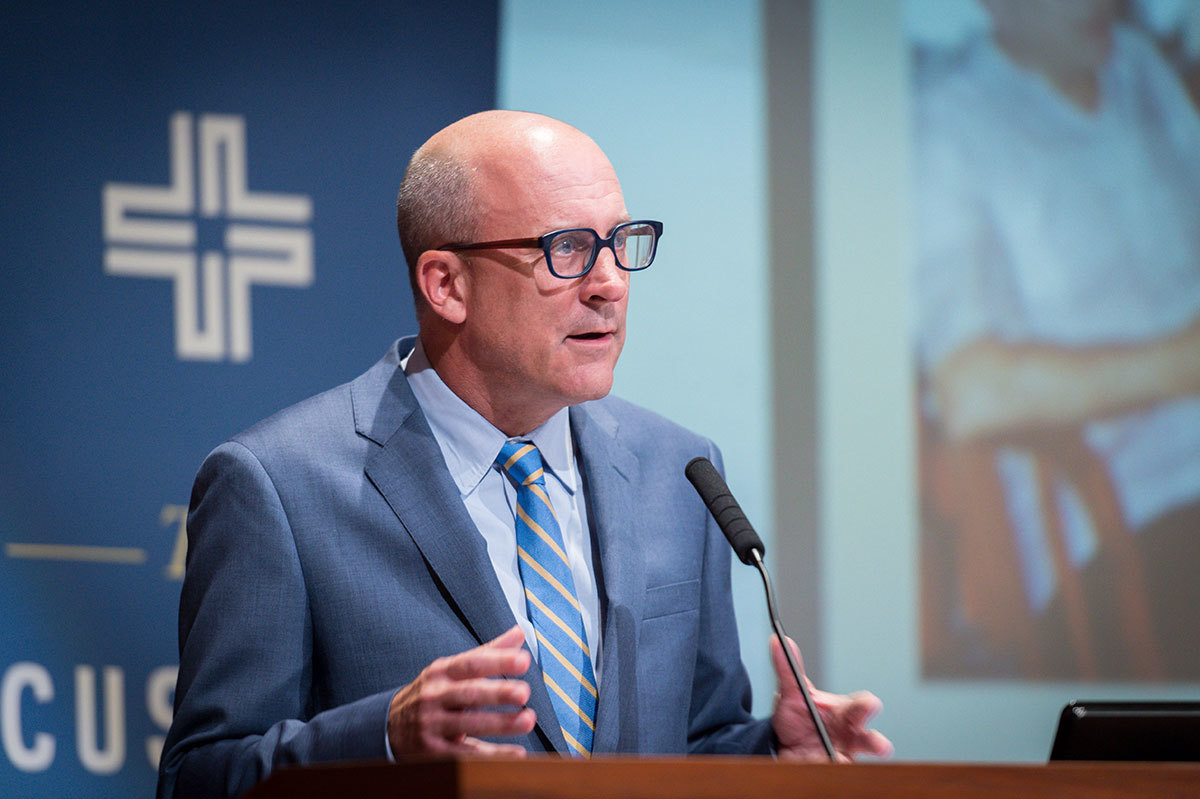
You’re going on research leave for the next year. What are your plans?
I want to be off the radar as much as possible, although, of course, I’ll be available to do anything I can to help incoming dean Sarah Mustillo. I think we’re really lucky to have her, and she’ll be a fantastic dean. My job is to just stay out of the way and if she asks, help her out.
I’ve been invited to give some talks, and I’ll make a couple trips to Europe and give talks there, which I didn’t really do as dean. I’ll have an office on campus, and I’ll be there writing most of the time. I need to recharge my scholarly career.
I’m working on a project on global Catholicism which builds off of my last book, American Jesuits and the World: How an Embattled Religious Order Made Modern Catholicism Global. I don’t quite know the form that the project will take in terms of articles or a book or how that’s all going to play out. I’ve got some conversations with publishers this summer scheduled, and we’ll see. I’m also organizing a conference with my colleague, Kathy Cummings, under the sponsorship of the Cushwa Center for the Study of American Catholicism. So that’s the next thing.
I actually think that watching our best faculty, as dean, and studying their tenure and promotion files, will make me a better faculty member. I look forward to doing so under Sarah’s leadership. I know her work will advance the college beyond what we can now envision and I’m really excited to see her flourish in this role.


